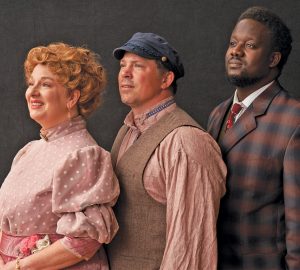It’s a pretty set—a leafy patio of a home on the outskirts of some American town. There are roses in the well-tended flowerbeds and lily pads in the pond; a pattern of leaves plays across the home’s genteel facade. You can almost feel the little breeze that quivers through the warm, early autumn morning. But a tree has blown down in the night, and lies like a fractured limb off the set and out into the audience. It’s a symbol, a portent that things are not as rosy as they seem, and a suggestion, perhaps, that we, the audience, also have a part to play.
The Rep’s version of Arthur Miller’s All My Sons, set in 1947, is a gripping inquiry into morality and social responsibility in what should be an optimistic post-war world. Based on a true story, it centers around businessman Joe Keller, who avoided financial ruin during the war by knowingly shipping cracked aircraft engine cylinder heads to the military, resulting in the deaths of 21 pilots. While Joe has never had to face the consequences of his deception, his business partner is in prison for his role in the crime. Meanwhile, Keller’s own son, Larry, has been missing for three years and while his mother, Kate, clings to the idea that he is still alive, her remaining son, Chris, firmly believes he is dead.
The characters are superbly cast: John Woodson is a bumptious Joe, whose heartiness cries out for comeuppance, and Margaret Daly is a mother consumed by loss. (“He was so real,” she says after a night of dreams, “that I could almost reach out and touch him.”) Chris, played energetically by Patrick Bell, is a voice of reason, moving on from the past by asking his brother’s fiancée to marry him.
The tension here is this: At whom, exactly, are the fingers pointing, and when (and, more important, how) are the guilty parties going to get their just desserts? Miller spreads the blame around: He isn’t looking just at Joe, but at a host of silent bystanders, so that in the end, everyone is responsible in one way or another. And perhaps no one can escape the consequences. Not even us.
All My Sons, likely born of the hardship in Miller’s own family (his father’s garment manufacturing company failed during the Great Depression), is a critical comment on the American Dream and the sometimes wrongful ways it can be achieved. We are reminded of this very real inspiration periodically throughout the play by a strange shadowy backdrop of coat racks that suspends above the stage like an idea in the writer’s mind.
Directed by Seth Gordon, All My Sons is a powerful beginning to The Rep’s 50th anniversary year.
Pictured: Patrick Ball and John Woodson
Photo: Jerry Naunheim Jr.








